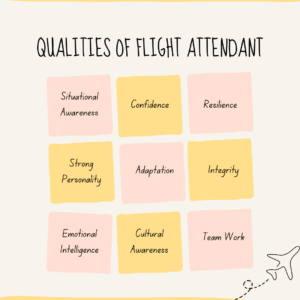Traits of a Successful Flight Attendant: Mental Fortitude in the Skies
In the aviation industry, where airplanes soar high and connections span the globe exceptional individuals are sought after, for the role of flight attendants. Apart from offering services with a smile successful flight attendants possess a set of qualities crucial for excelling in this ever-changing and demanding field. This article explores the characteristics that distinguish flight attendants, such as being aware of their surroundings having confidence showing resilience possessing a strong personality being adaptable, and demonstrating integrity.
Situational Awareness: Key to Ensuring Aviation Safety
Among these qualities lies awareness. An understanding of one’s environment and the ability to foresee potential challenges before they occur. In the confined space of an aircraft where conditions can shift swiftly situational awareness is paramount. A flight attendant with heightened awareness is constantly mindful of the cabin atmosphere, passenger behaviors, and moods well as subtle cues that could signal issues. This alertness guarantees safety and enables responses to emergencies making it an essential aspect of effective onboard service.
Confidence: A Stabilizing Force During Turbulent Times
Confidence in a flight attendant goes beyond being friendly; it serves as a stabilizing force, amidst turbulence and challenges. Passengers feel a sense of security and calmness when flight attendants exude confidence in situations, like turbulent weather or emergencies on board. A confident flight attendant can effectively take charge give instructions and reassure passengers preventing panic and maintaining order. Confidence goes beyond being a trait-it’s a tool.
Resilience: Bouncing Back with Grace
The life of a flight attendant is filled with challenges from schedules to handling difficult passengers. Being resilient the ability to quickly recover from setbacks is essential. Resilient flight attendants approach obstacles with a problem-solving mindset. They adapt, learn from experiences, and bounce back gracefully ensuring that their service quality remains top-notch despite struggles or tough situations. This mental strength benefits the flight attendant and enhances the overall passenger experience.
Strong Personality: The Essence of Leadership
In roles of authority and responsibility that flight attendants often find themselves in having a strong personality is key. This trait includes assertiveness, leadership skills, and the ability to make decisions under pressure. A flight attendant, with a personality earns respect and commands attention during safety briefings or emergencies.
Balancing authority with empathy setting an example, and encouraging others to do the same is crucial in leadership.
Adaptation: The Art of Versatility
Adaptability stands out as a trait, for flight attendants empowering them to navigate scenarios on board with grace and effectiveness. In the changing setting of an airplane, circumstances can swiftly shift—from tending to emergencies to addressing passenger queries. The ability to adapt allows flight attendants to stay quick on their feet and devise solutions guaranteeing passenger well-being and contentment. This versatility proves crucial not only for handling occurrences but also for embracing cultural differences among travelers. It aids in delivering service and managing a range of personalities and requirements efficiently. Furthermore, adaptability fosters teamwork, for upholding a harmonious and professional ambiance during flights. This competence is thus fundamental, in upholding the airlines’ standards and ensuring passengers enjoy a travel experience.
Integrity: The Foundation of Trust
Integrity is the foundation upon which the trust between crew and passengers is built. It involves honesty, ethical behavior, and a strong moral compass. Flight attendants with high integrity are trusted by their colleagues and passengers alike. They uphold the standards of the airline and ensure that every action taken is in the best interest of safety and service quality.
Emotional Intelligence: Understanding Beyond Words
Emotional intelligence is the ability to understand and manage one’s emotions and to empathize with others. For a flight attendant, this trait is indispensable. It enables them to read the emotional state of passengers, provide support during stressful situations, and defuse conflicts with empathy and understanding. An emotionally intelligent flight attendant creates a comfortable and reassuring environment for everyone on board.
Cultural Awareness: The Global Connector
In today’s interconnected world flights serve as bridges between cultures and societies. Demonstrating sensitivity-acknowledging and honoring distinctions-is essential. It empowers flight attendants to engage successfully with travelers from different backgrounds respecting their traditions and preferences. also, it strengthens the relationship between the team members. This enhances passenger well-being. Also embodies the inclusive principles of the airline.
Teamwork: Flying High Together
Finally, teamwork is vital for flight attendants, ensuring a safe, efficient, and pleasant flying experience. In emergencies, cohesive teamwork enables quick, coordinated responses, crucial for passenger safety. During regular operations, team collaboration ensures efficient cabin management, from service delivery to addressing passenger needs. It promotes a harmonious work environment, enhancing job satisfaction and reducing stress in high-pressure situations. Effective teamwork also facilitates clear communication, essential in a dynamic, fast-paced setting. Moreover, it strengthens problem-solving skills, as attendants bring diverse perspectives and solutions. Ultimately, teamwork among flight attendants is key to maintaining high service standards and ensuring passenger safety and comfort.

Lastly, the role of a flight attendant goes far beyond serving meals and demonstrating safety procedures. It requires a complex set of mental traits that include situational awareness, confidence, resilience, a strong personality, adaptability, integrity, emotional intelligence, cultural sensitivity, and teamwork. These traits enable flight attendants to perform their duties effectively, ensuring the safety, comfort, and satisfaction of passengers. They are the unsung heroes of the skies, whose mental fortitude and skillful handling of challenges make air travel a safe and enjoyable experience for all.

A small tip that helped me acquire these traits in my ten years of flying is dedicating 5-minutes of meditation before my duty, meditation has become a tool for handling stress and boosting concentration beneficial for flight attendants. In the paced and often unpredictable realm of air travel maintaining composure and mental clarity is essential. Taking 5 minutes to meditate before starting your shift can be incredibly beneficial. It’s a small time commitment that can result in improved patience, decision-making skills, and overall well-being enhancements – all aspects of being a successful flight attendant. Understanding the demanding schedules and unique obstacles faced by flight attendants underscores the need for efficient meditation resources. Calm.com provides an option with its array of 5-minute meditation sessions. These sessions are tailored to fit routines offering an impactful way to reset your mindset and gear up for upcoming challenges. Whether you’re a flight attendant or new, to the field integrating these short meditation practices into your routine could significantly enhance your work-life satisfaction.







